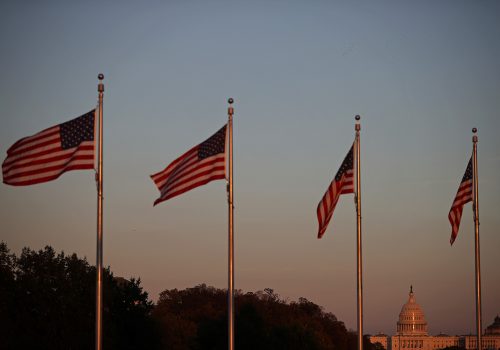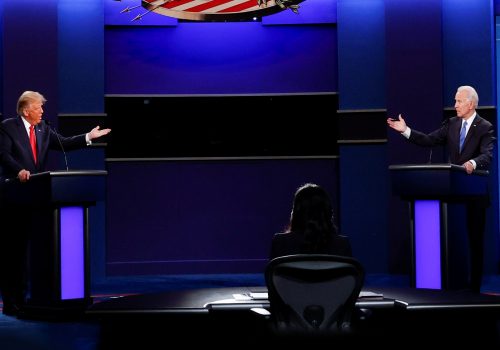November 5, 2020
FAST THINKING: The US election’s implications for allies and adversaries
Welcome to Fast Thinking, our new service for delivering rapid insight from Atlantic Council experts on global events as they unfold. To receive our Fast Thinking alerts in your inbox, sign up below:
Subscribe to Fast Thinking email alerts
Sign up to receive rapid insight in your inbox from Atlantic Council experts on global events as they unfold.

JUST IN
We don’t yet know the winner of the US presidential race—and, with the count so close and the prospect of contested results, we might not for some time, but the world is already drawing lessons from the outcome. So what are the likely takeaways in foreign capitals right now?
TODAY’S EXPERT REACTION COURTESY OF
- Barry Pavel: Former US national security official and director of the Atlantic Council’s Scowcroft Center for Strategy and Security, weighing in from Washington, DC
- Erica Borghard: Senior director on the US Cyberspace Solarium Commission and Atlantic Council resident senior fellow, weighing in from New York
- Will Wechsler: Former deputy assistant secretary of defense and director of the Atlantic Council’s Middle East programs, weighing in from Washington, DC
- Anna Wieslander: Chair of the Institute for Security and Development Policy and Atlantic Council director for Northern Europe, weighing in from Stockholm
The near-term danger
- We appear to be headed, Barry notes, for “a period of sustained contestation in US domestic politics,” which brings “a heightened danger that China and Russia try to take advantage of what they might perceive as US distraction and complete focus on internal affairs.” With the United States already facing “a raging pandemic, a throttled economy, and ongoing cyberattacks and information operations in the US homeland,” this could, in fact, shape up to “be the most dangerous transition period in US history.”
- This isn’t just conjecture, he adds. Look at what China and Russia are already up to: “It is not a coincidence that Chinese aircraft incursions into Taiwanese airspace peaked in October and that Chinese leadership rhetoric about bringing Taiwan under China’s formal control sooner rather than later increased this year. Russia almost certainly will take this opportunity to sow greater disinformation on social media in the US and to conduct continued offensive cyber operations to hack US election-related systems and processes.”
- Barry’s advice for the US government? “Send public and private deterrence messages to the Russian and Chinese regimes, send messages of reassurance to US allies under threat in Europe and the Indo-Pacific, ensure that US military forces demonstrate a high degree of readiness to sustain deterrence of Russian and Chinese aggression near potential flashpoints, and strengthen our homeland security vigilance and processes.”
What that danger could actually look like
Erica spins through the hypothetical scenarios in the event of contested election results:
- “China or Russia could seek to strengthen control over contested territorial claims, creating new facts on the ground or at sea.”
- “Iran could take actions against forward-deployed US personnel and assets in Iraq and the broader region, or even American citizens overseas, perhaps seeing a chance to retaliate against the US for the killing of Qasem Soleimani.”
- “North Korea could perceive an opportunity to conduct another set of missile tests.”
- Russia, Iran, and other adversaries “could ramp up information operations to create additional chaos and undermine the process for ascertaining the outcome” of the 2020 election in the United States, or “conduct cyber operations against, for instance, critical infrastructure to test the government’s responsiveness.”
The longer-term assessments of allies
- Will worries that US adversaries and allies alike will interpret the election results, however they ultimately shake out, as portending a United States “increasingly focused inward” on the “deep divisions in American society,” with political dysfunction continuing to undermine its foreign policy and leadership in the world.
- The results will have consequences for America’s global standing, he adds: “For some foreign observers, especially many policymakers in Europe, America’s moral leadership has suffered a serious blow. These officials saw the Trump presidency as being incompatible with what they knew and admired about American values and the liberal world order that the United States created,” and “they will not be able to explain away the fact that millions of Americans voted the same way a second time, denying any such repudiation” of the 2016 election result. Even if Joe Biden “eventually emerges victorious, these foreign policymakers are likely to rethink some of their fundamental assumptions about the United States going forward.”
The view from Europe
- Anna reports that the election results have shocked many Europeans, who weren’t really prepared for the possibility of a second Trump term. “Is it possible for such a deeply divided country to forge consensus and lead globally?” she asks.
- Such questions in many European capitals, she notes, have revived “the debate on the need for Europe to take its destiny in its own hands and invest more in its security and strategic autonomy.” That debate, she says, “is necessary regardless of which candidate wins in the end” since “it will prepare Europe to be a more equal partner to the US in global affairs, which is the preferred track, but also to stand more steadily on its own feet when necessary.”
Further reading
Wed, Nov 4, 2020
What America’s allies and adversaries will make of the 2020 election
Elections 2020 By William F. Wechsler
Rather than provide an opportunity to “bind up the nation’s wounds” once again, the election has instead clearly confirmed the deep divisions in American society by class, region, race, gender, religion, and culture. No matter who wins the presidency, the result will likely be a nation increasingly focused inward on the implications of these divisions.
Fri, Oct 30, 2020
Democracy at home is the source of American power abroad
Elections 2020 By Peter Engelke, Julian Mueller-Kaler
The United States does have the power to both right its own ship and fully employ its example to good effect around the world, but only if its citizens stay engaged in the hard work of democratic self-governance.
Wed, Oct 28, 2020
2020 election scenarios: Implications for American foreign policy
Issue Brief By Ash Jain, Barry Pavel
The outcome of the US presidential election in November will reverberate throughout the world. It will have a direct impact on US allies and partners, as well as structural implications for the global system. Will the United States continue to play its post-World War II international leadership role? Or will Washington continue its steady retreat from international commitments?
Image: Yegor Aleyev/TASS via Reuters


